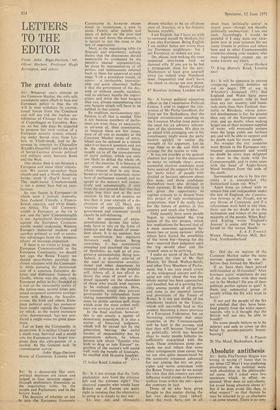Sir: in a democracy like ours. political decisions are taken
and judged in four separate stages— through preliminary discussion: at the negotiating table; by the people and Parliament; and in the history books.
The decision of whether or not to join the Eqropean Economic Community is, however excep- tional its importance, a case in point. Firstly, after months and years of debate on the pros and cons up and down the country, it is agreed to put the issue to the test of negotiation.
Next, at the negotiating table (in Brussels and elsewhere), nobody claims that the discussions should necessarily be conducted by the people's elected representatives, let alone by representatives of all parties, and continuously referred back to them for approval at each stage. S-ch a procedure would, of coursz ne intolerable, impractic- able and quite abnormal. Suffice it that the government of the day, with or without specific mandate, and its advisers handle the negoti- ations and drive the best bargain they can, always remembering that any bargain struck will have to be ratified in due course.
By tradition, parliamentary rati- fication is all that is needed. This is not because members of parlia- ment are wiser than, or necessarily in advance of, their constituents, or because there are few issues, least of all one as complex as the Common Market terms of entry, which can be reduced to a simple take-it-or-leave-it question and put to the electorate without being caught up in all the cross:currents of party politics, which are only too likely to defeat the whole ob- ject of the exercise. It is because of the essence of our constitution, which ensures that in any issue, however trivial or important, mem- bers of parliament consult and re- spond to the nation's will instinc- tively and automatically, if only from the ever-present fear that they might lose their seat at the next election. In this of all matters, no less than in your example of a de- claration of war (22 May). any 'exercise of unpopular will by government and commons' would clearly be self-defeating.
Nor do opponents of extra- constitutional devices like refer- enda have to rely on the force of. tradition and the dearth of prece- dent alone. It is no accident that our constitution has regularly forsworn such devices. Being unwritten, it has consistently preached and practised the virtue of flexibility, as well as of pro- gressive accountability. Being non- federal, it is doubly relieved of the need to determine constitu- tional and other departures by repeated reference to the popular will. Above all, it can afford to throw the onus of proof or dis- proof squarely on the shoulders of those who would wish matters to be ordered otherwise. How, for example, would they prevent government by referendum from sliding imperceptibly into govern- ment by public opinion poll, from which even the most ardent poll- sters are anxious to preserve us?
In the final analysis, however,
this is not simply a matter of democratic procedure. It is also a matter of historical judgment, which will be passed not by the generation bearing the awful burden of responsibility but by generations unborn, by whom present talk about "fanatics who wish to drag us into Europe" re- gardless of the nation's will could well, with the benefit of hindsight, be recalled with Homeric laughter,
W. Grey 12 Arden Road, London N3


































 Previous page
Previous page